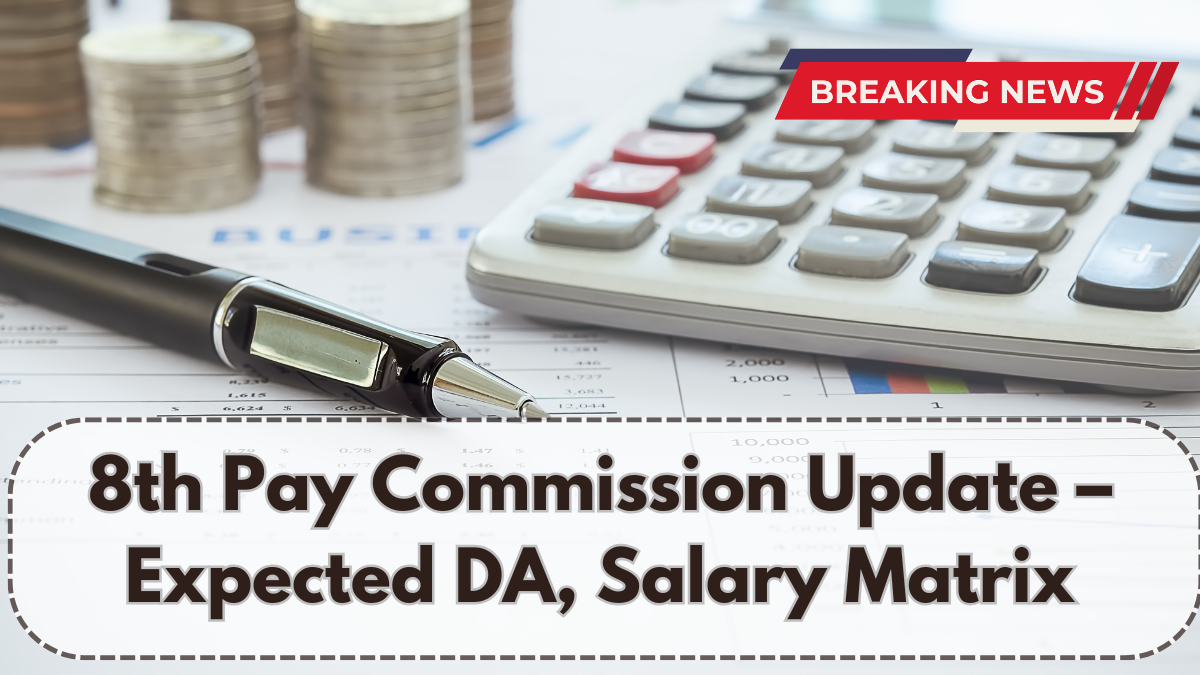The Indian government is moving forward with preparations for the 8th Pay Commission, which is set to significantly revise the salary structure and Dearness Allowance (DA) benefits for central government employees and pensioners. This long-anticipated update is seen as a vital financial reform aimed at uplifting the income of lakhs of government workers and ensuring their compensation aligns with inflation and economic growth.
The 8th Pay Commission will affect not only employees of the central government but also those in public sector undertakings and autonomous bodies. As the 7th Pay Commission was implemented back in 2016, the call for a new revision has grown louder—and the 8th Commission is now reportedly being readied for its formal rollout.
This comprehensive update will bring a fresh salary matrix, improvements in allowances, and crucial changes in how central government jobs are compensated.

Major Changes Expected in the 8th Pay Commission
The 8th Pay Commission is expected to overhaul the salary structure of government employees in line with rising living costs and modern workforce expectations. Here’s what employees can expect:
-
Updated salary matrix: Revised pay bands and grade pay to ensure uniformity and transparency in promotions.
-
DA hike integration: Higher base pay with existing DA merged into the new structure.
-
Retirement benefits: Enhanced pension calculations and benefits for retired personnel.
-
Children’s education allowance: Possible hike in existing benefits for school-going children of employees.
-
Transport and HRA revision: Better reimbursement values based on updated city classifications.
The 8th Pay Commission aims to ensure dignity, fair compensation, and improved quality of life for India’s vast government workforce. The Commission is also expected to focus more on performance-linked benefits.
Revised Salary Matrix and DA Hike Details
One of the most significant aspects of the 8th Pay Commission will be the updated salary matrix. A proposed increase of at least 20% to 25% in the basic salary is under discussion. Below is a sample projection of possible changes:
| Pay Level | Current Basic (7th CPC) | Proposed Basic (8th CPC) |
|---|---|---|
| Level 1 | ₹18,000 | ₹22,000 – ₹23,000 |
| Level 6 | ₹35,400 | ₹42,000 – ₹44,000 |
| Level 10 | ₹56,100 | ₹67,000 – ₹70,000 |
| Level 13A | ₹1,31,100 | ₹1,57,000 – ₹1,60,000 |
Dearness Allowance (DA), which compensates for inflation, will also see a structural improvement. The DA is expected to reset at a lower base initially, with periodic hikes tied to the new Consumer Price Index formula. This ensures that central government jobs stay attractive and offer consistent income growth.
Implementation Timeline and Commission Setup
The Union Government typically constitutes a Pay Commission every 10 years. With the last one set up in 2014 and implemented in 2016, the 8th Pay Commission is widely expected to be established officially in 2025.
Key points related to the timeline include:
-
Commission Constitution: Expected by the end of 2025
-
Recommendation Submission: 12–18 months post-formation
-
Implementation Period: By mid to late 2026, as per regular cycles
The 8th Pay Commission will consist of economists, administrative officers, and representatives from staff associations to ensure wide representation. This ensures that every major employment category under central government jobs is addressed fairly.
Who Will Benefit from the 8th Pay Commission?
The scope of the 8th Pay Commission is vast and includes a wide array of personnel. Those who stand to benefit directly include:
-
Central Government employees (Group A, B, C)
-
Pensioners and family pensioners
-
Employees of Central Autonomous Bodies
-
Employees under specific state departments following central scales
-
Public Sector Undertaking (PSU) staff where applicable
With over 50 lakh employees and 65 lakh pensioners, the 8th Pay Commission update is among the most awaited in India’s public service sector. It not only improves financial well-being but also reflects the government’s commitment to service dignity.
FAQs
Will the 8th Pay Commission definitely be implemented?
Yes, preparations are already underway. Like previous pay commissions, the 8th is expected to be implemented in the next cycle starting 2026.
How much salary hike is expected in the 8th Pay Commission?
A salary hike of 20% to 25% in basic pay is expected, along with merged Dearness Allowance and revised allowances.
Will pensioners also benefit from the 8th Pay Commission?
Yes, pensioners and family pensioners are covered, with changes in pension calculation methods and higher minimum pensions.
What changes are likely in the Dearness Allowance?
DA will be realigned with the new salary structure. It may start at a lower base but with more frequent adjustments to inflation.
Which sectors will be affected by the 8th Pay Commission?
All central government jobs, including ministries, defence forces, autonomous bodies, and certain PSUs, will fall under its scope.
Click here to know more.
Aanchal is a passionate writer with a keen interest in storytelling, content creation, and creative expression. She enjoys exploring diverse topics and crafting engaging narratives that captivate readers.




